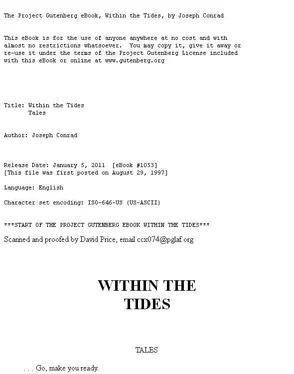“That’s the story. He rallied a little one night and said he wanted to tell me something. I, being a gentleman, he said, he could confide in me. I told him that he was mistaken. That there was a good deal of a plebeian in me, that he couldn’t know. He seemed disappointed. He muttered something about his innocence and something that sounded like a curse on some woman, then turned to the wall and—just grew cold.”
“On a woman,” cried Miss Moorsom indignantly. “What woman?”
“I wonder!” said Renouard, raising his eyes and noting the crimson of her ear-lobes against the live whiteness of her complexion, the sombre, as if secret, night-splendour of her eyes under the writhing flames of her hair. “Some woman who wouldn’t believe in that poor innocence of his. . . Yes. You probably. And now you will not believe in me—not even in me who must in truth be what I am—even to death. No! You won’t. And yet, Felicia, a woman like you and a man like me do not often come together on this earth.”
The flame of her glorious head scorched his face. He flung his hat far away, and his suddenly lowered eyelids brought out startlingly his resemblance to antique bronze, the profile of Pallas, still, austere, bowed a little in the shadow of the rock. “Oh! If you could only understand the truth that is in me!” he added.
She waited, as if too astounded to speak, till he looked up again, and then with unnatural force as if defending herself from some unspoken aspersion, “It’s I who stand for truth here! Believe in you! In you, who by a heartless falsehood—and nothing else, nothing else, do you hear?—have brought me here, deceived, cheated, as in some abominable farce!” She sat down on a boulder, rested her chin in her hands, in the pose of simple grief—mourning for herself.
“It only wanted this. Why! Oh! Why is it that ugliness, ridicule, and baseness must fall across my path.”
On that height, alone with the sky, they spoke to each other as if the earth had fallen away from under their feet.
“Are you grieving for your dignity? He was a mediocre soul and could have given you but an unworthy existence.”
She did not even smile at those words, but, superb, as if lifting a corner of the veil, she turned on him slowly.
“And do you imagine I would have devoted myself to him for such a purpose! Don’t you know that reparation was due to him from me? A sacred debt—a fine duty. To redeem him would not have been in my power—I know it. But he was blameless, and it was for me to come forward. Don’t you see that in the eyes of the world nothing could have rehabilitated him so completely as his marriage with me? No word of evil could be whispered of him after I had given him my hand. As to giving myself up to anything less than the shaping of a man’s destiny—if I thought I could do it I would abhor myself. . . .” She spoke with authority in her deep fascinating, unemotional voice. Renouard meditated, gloomy, as if over some sinister riddle of a beautiful sphinx met on the wild road of his life.
“Yes. Your father was right. You are one of these aristocrats . . .”
She drew herself up haughtily.
“What do you say? My father! . . . I an aristocrat.”
“Oh! I don’t mean that you are like the men and women of the time of armours, castles, and great deeds. Oh, no! They stood on the naked soil, had traditions to be faithful to, had their feet on this earth of passions and death which is not a hothouse. They would have been too plebeian for you since they had to lead, to suffer with, to understand the commonest humanity. No, you are merely of the topmost layer, disdainful and superior, the mere pure froth and bubble on the inscrutable depths which some day will toss you out of existence. But you are you! You are you! You are the eternal love itself—only, O Divinity, it isn’t your body, it is your soul that is made of foam.”
She listened as if in a dream. He had succeeded so well in his effort to drive back the flood of his passion that his life itself seemed to run with it out of his body. At that moment he felt as one dead speaking. But the headlong wave returning with tenfold force flung him on her suddenly, with open arms and blazing eyes. She found herself like a feather in his grasp, helpless, unable to struggle, with her feet off the ground. But this contact with her, maddening like too much felicity, destroyed its own end. Fire ran through his veins, turned his passion to ashes, burnt him out and left him empty, without force—almost without desire. He let her go before she could cry out. And she was so used to the forms of repression enveloping, softening the crude impulses of old humanity that she no longer believed in their existence as if it were an exploded legend. She did not recognise what had happened to her. She came safe out of his arms, without a struggle, not even having felt afraid.
“What’s the meaning of this?” she said, outraged but calm in a scornful way.
He got down on his knees in silence, bent low to her very feet, while she looked down at him, a little surprised, without animosity, as if merely curious to see what he would do. Then, while he remained bowed to the ground pressing the hem of her skirt to his lips, she made a slight movement. He got up.
“No,” he said. “Were you ever so much mine what could I do with you without your consent? No. You don’t conquer a wraith, cold mist, stuff of dreams, illusion. It must come to you and cling to your breast. And then! Oh! And then!”
All ecstasy, all expression went out of his face.
“Mr. Renouard,” she said, “though you can have no claim on my consideration after having decoyed me here for the vile purpose, apparently, of gloating over me as your possible prey, I will tell you that I am not perhaps the extraordinary being you think I am. You may believe me. Here I stand for truth itself.”
“What’s that to me what you are?” he answered. “At a sign from you I would climb up to the seventh heaven to bring you down to earth for my own—and if I saw you steeped to the lips in vice, in crime, in mud, I would go after you, take you to my arms—wear you for an incomparable jewel on my breast. And that’s love—true love—the gift and the curse of the gods. There is no other.”
The truth vibrating in his voice made her recoil slightly, for she was not fit to hear it—not even a little—not even one single time in her life. It was revolting to her; and in her trouble, perhaps prompted by the suggestion of his name or to soften the harshness of expression, for she was obscurely moved, she spoke to him in French.
“ Assez ! J’ai horreur de tout cela ,” she said.
He was white to his very lips, but he was trembling no more. The dice had been cast, and not even violence could alter the throw. She passed by him unbendingly, and he followed her down the path. After a time she heard him saying:
“And your dream is to influence a human destiny?”
“Yes!” she answered curtly, unabashed, with a woman’s complete assurance.
“Then you may rest content. You have done it.”
She shrugged her shoulders slightly. But just before reaching the end of the path she relented, stopped, and went back to him.
“I don’t suppose you are very anxious for people to know how near you came to absolute turpitude. You may rest easy on that point. I shall speak to my father, of course, and we will agree to say that he has died—nothing more.”
“Yes,” said Renouard in a lifeless voice. “He is dead. His very ghost shall be done with presently.”
She went on, but he remained standing stock still in the dusk. She had already reached the three palms when she heard behind her a loud peal of laughter, cynical and joyless, such as is heard in smoking-rooms at the end of a scandalous story. It made her feel positively faint for a moment.
Читать дальше












